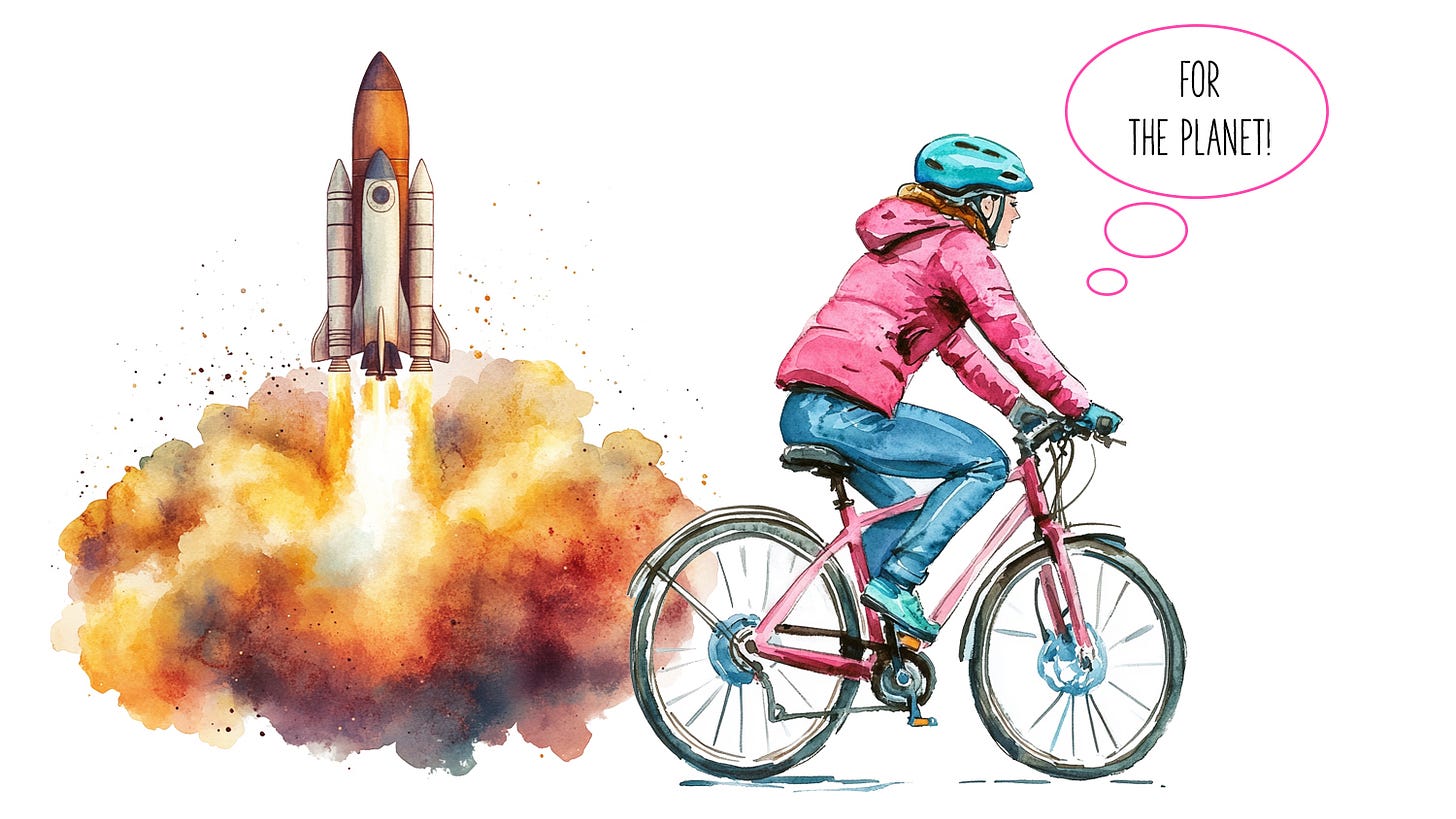The Most Responsible Way to Burn a Barrel of Oil
What if we treated fossil fuels not as villains, but as the startup capital for a clean energy future?
As you may have heard, somewhere in space, a couple of celebrities just burned 700,000 pounds of fuel per second, contributed about 300 tons of carbon emissions, and spent a few million dollars for an eleven-minute joyride to outer space, courtesy of Blue Origin and Jeff Bezos.
Bezos claims the rocket fuel is “clean”—just liquid hydrogen and methane that emit only water vapor. But take a closer look, and you’ll find that both fuels are made using fossil-intensive processes like steam methane reforming, which emits carbon dioxide, carbon monoxide, and even carbon black. The emissions aren’t gone—they’re just upstream.
And of course, the source of Bezos’ fortune—Amazon—is one of the largest engines of overconsumption on the planet, fueling a marketplace of single-use everything and destroying overstock by the ton.
Meanwhile, here on Earth, I’m calculating whether the carbon offset of riding my bike at 6:30 in the morning with wet hair and bone-chilling wind in my face was a better idea than driving 8 minutes in my gas-powered Subaru.
It’s a bizarre time to be alive.
Yesterday I spoke with a Master’s student in Europe. Bright, curious, and right at that critical stage of academic exploration where everything is exciting… and overwhelming. He wants to focus on circular economy, or maybe sustainable architecture, or maybe batteries, or maybe all of it.
I remember that feeling well—the paradox of choice. The fear of picking something boring. The dream of creating something world-changing. The deep craving for someone to say: “That idea. Do that one.”
Back in college, I didn’t have a roadmap either. I just wanted to build a self-sustaining ecosystem that taught kids how to grow basil and flower baskets, and make money doing it. Instead, I found myself elbow-deep in soil, writing my senior thesis on Black Truffle Economics—a fungi-based agroforestry concept of inoculating Hazelnut trees with lucrative underground mushrooms. In case you're curious, it’s on par with Russian Roulette, in terms of viability.
The point is, the path to what we focus on is never straight.
But the questions we ask along the way matter.
And lately, I’ve been asking a big one:
What should we be using fossil fuels for?
Because, despite what the billboards say, fossil fuels aren’t evil. They’re powerful. Miraculous, even. Ancient sunlight, stored underground for millions of years, capable of heating, shaping, transporting, and transforming nearly everything around us.
But they’re also finite.
And we’re blowing through them like my son blows through a pack of PopRocks—one sugar-coated explosion at a time.
Oil is startup capital for the clean energy world
Let’s imagine, just for a second, that fossil fuels are not the villain.
Let’s pretend they’re our venture capital.
What would be the wisest investment?
Would we spend it sending billionaires into space to achieve the spiritual fulfillment of looking at Earth from afar, while burning through enough fuel to power an off-grid village for a year? Guess who even agrees how dumb it is.
(Here’s looking at you, Blue Origin. No shade to feminism, but hold the rocket fuel.)
The fuel we have left belongs to all of us.
I can’t help but be reminded of Chevy Chase in the Three Amigos:
Or would we use our precious capital to build the systems we actually need to harmonize human life with Planet Earth?
Solar panels, wind turbines, batteries, and ways to harness energy long-term
Technologies and equipment to reclaim critical metals & materials
Low-carbon, long lasting housing materials
Food systems that work with nature, not against it
A robust and efficient transportation network
We have a shot at doing this right. But only if we treat oil like the non-renewable resource it is—not as a party trick or convenience, but as a means to build the bridge to what’s next.
Future humans will judge us by what we did with our fuel
There’s something uniquely human about foresight.
My dog doesn’t know we’re going hiking tomorrow.
He lives in the moment.
He doesn’t plan for winter, or taxes, or the looming scarcity of diesel.
But I do.
I know how much half-and-half is left in the fridge.
I know the weight of $150 in the bank.
I know what it feels like to carry a Camelbak of water on a 30-mile hike, sipping carefully, rationing for the return trip.
We know the future is coming, and that knowledge is a gift—and a burden.
While we burn what’s left of our fossil fuels on landfill-bound junk like cheap clothes, millions of pounds of unsold stock, and climate-controlled indoor ski resorts, we’re being careless.
We’re betraying our most human trait:
The ability to think beyond now, and well into the future.
Burn wisely. Build better.
I don’t have all the answers. But I do know this:
Fossil fuels should not be fueling joyrides.
They should be fueling smart infrastructure.
We can build a world that thrives beyond oil.
But it requires intention.
It requires that we start seeing every barrel of oil as a one-time-use inheritance.
The question isn’t whether we should use it—but how.
Are we blowing it on fast thrills and status symbols—like a teenager squandering their great-grandparent’s nest egg on designer clothes, rare steak, and a Porsche they can’t afford to maintain?
Or are we investing it wisely—using it to build the systems, tools, and knowledge we’ll need when the money’s gone?
Fossil fuels are powerful. They gave us the world we have.
Let’s be the generation that used them—strategically, intentionally.
To build the world we want.





Yes!! I have thought about this before and am so happy to see you lay it out and so clearly. Two years ago, NYC's Climate march was the march to "end fossil fuels" and I felt like that was so ill-advised. I'm not in anyway denying that there are bad actors but fossil fuels are powerful and the companies that deal in them have an enormous amount of knowledge and experience that could be used to expedite the transitions that will help us reserve our stores of fossil fuels for the places where we will continue to need them for years to come. Radical collaboration ftw.
Right on! That is the kind of thinking we need. If we don't use the energy we have locked up in fossil fuels to create a green energy system capable of generating enough energy to sustain our global system, human society as we know it will cease to exist.